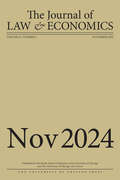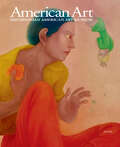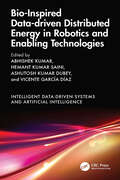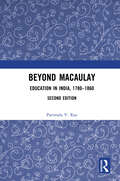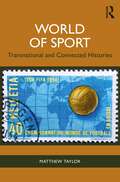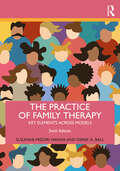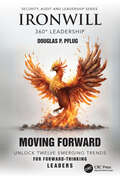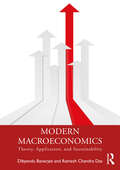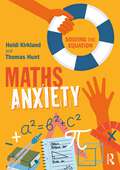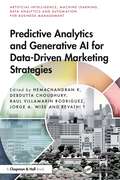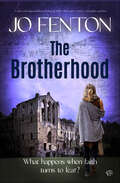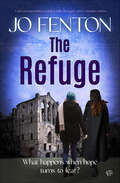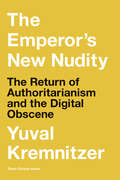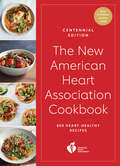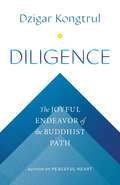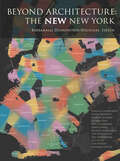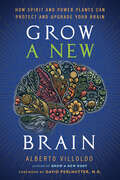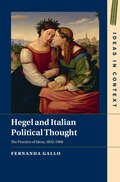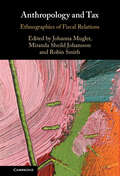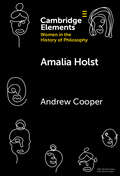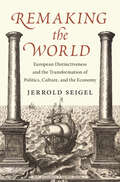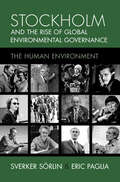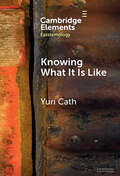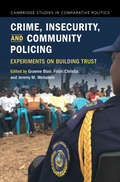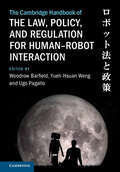- Table View
- List View
The Journal of Law and Economics, volume 67 number 4 (November 2024)
by The Journal of Law and EconomicsThis is volume 67 issue 4 of The Journal of Law and Economics. Established in 1958, the Journal of Law and Economics publishes research on a broad range of topics, including the economic analysis of law, the economic analysis of regulation and the behavior of regulated firms, industrial organization and antitrust policy, the political economy of legislation and legislative processes, law and finance, and corporate finance and governance. The JLE has published some of the most influential and widely cited articles in these areas. It is an invaluable resource for academics and those interested in cutting-edge analysis of current public policy issues.
American Art, volume 38 number 3 (Fall 2024)
by American ArtThis is volume 38 issue 3 of American Art. American Art publishes innovative peer-reviewed scholarship on the history of art and related visual culture. The journal critically engages with the material and conceptual conditions of art and provides a forum for the expanding field of American art history. It welcomes scholarship on the role played by art in the ongoing transnational and transcultural formation of America as a contested geography, identity, and idea. Committed to rigorous inquiry, the journal presents a range of approaches to the production and consumption of art.
Bio-Inspired Data-driven Distributed Energy in Robotics and Enabling Technologies (Intelligent Data-Driven Systems and Artificial Intelligence)
by Abhishek Kumar Hemant Kumar Saini Ashutosh Kumar Dubey Vicente García-DíazThis book begins by introducing bio-inspired data-driven computation techniques, discussing bio-inspired swarm models, and highlighting the development of interactive bio-inspired energy harvesting systems to drive transportation infrastructure. It further covers important topics such as efficient control systems for distributed and hybrid renewable energy sources, and smart energy management systems for developing intelligent systems. This book: Presents data-driven intelligent heuristics for improving and advancing environmental sustainability in both eco-cities and smart cities. Discusses various efficient control systems for distributed and hybrid renewable energy sources and enhance the scope of smart energy management systems for developing even intelligent systems. Showcases how distributed energy systems improve the data-driven robots in the Internet of Medical Things. Highlights practical approaches to optimize power generation, reduce costs through efficient energy, and reduce greenhouse gas emissions to the possible minimum. Covers bio-inspired swarm models, smart data-driven sensing to combat environmental issues, and futuristic data-driven enabled schemes in blockchain-fog-cloud assisted medical eny ecosystem. The text is primarily written for graduate students, and academic researchers in diverse fiergelds including electrical engineering, electronics and communications engineering, computer science and engineering, and environmental engineering.
Beyond Macaulay: Education in India, 1780–1860
by Parimala V. RaoBeyond Macaulay provides a radical and comprehensive history of Indian education in the early colonial era from 1780 to 1860. It critically explores data of 16,000 indigenous schools, which shows that indigenous education was not oral, informal, and Brahmin-centric but written, formal, and egalitarian. Based on rich archival evidence, the book challenges the conventional theory that the British administration imposed the English language and modern education on Indians. By including hitherto unused 41 Educational Minutes of Macaulay, the volume examines his educational ideas, his insistence on compulsory teaching of Indian languages in English schools, his encouragement of the Hindi language, his opposition to making Arabic as a medium of instruction in medical and technical education opens up hither to unknown perspectives on Orientalist-Modernist debates. Contrasting the educational ideas of the British elites and the Orientalists with dissenting Scottish voices, it shows that the colonial administration was not monolithic. The book discusses post-Macaulayan educational policies, closing down of Macaulay’s schools and the Wood’s Despatch of 1854 as well as how people protected English schools during the revolt of 1857.This second edition is supplemented with complete student essays which reveal the students’ use of the English language, classical imageries, the debates in Europe and finally, their own location in Indian society. The essays by upper caste, OBC and Dalit students demonstrate their extraordinary competency and command over the English language. The book will be of great interest to scholars and researchers of education, history of education, Indian history, the history of English language teaching in India, sociology, and political science.
World of Sport: Transnational and Connected Histories
by Matthew TaylorWorld of Sport examines the development of modern sport from the mid-nineteenth century to the 1960s in the light of transnational approaches to history.Critically probing existing studies and offering new insights, this volume demonstrates that while sport was a national and international phenomenon, it was invariably constructed transnationally. Taking in topics ranging from the dissemination of football codes to transpacific surfing cultures, and the touring lives of baseball and hockey players to the contact zones of international competition, it emphasises the importance of transnational perspectives in the way people around the globe experience sport. Like other forms of popular culture, sport cannot be properly understood without reference to the cross-national connections that helped to disseminate rules and regulations, circulated styles of play and performance, and drove forward regional and international competition. Drawing on case studies that range time periods and continents, World of Sport is a must-read for students and researchers interested in the place of sport in the interconnected modern world and the transnational origins of the global sporting order in the twenty-first century.
The Practice of Family Therapy: Key Elements Across Models
by Suzanne Midori Hanna Derek A. BallNow in its sixth edition, The Practice of Family Therapy comes at a time when traditional approaches to psychotherapy have given way to multidimensional strategies that best serve the needs of diverse groups who are grappling with the many challenges unique to family therapy practice. With expanded coverage of different models, along with new developments in evidence-based and postmodern practices, this integrative textbook bridges the gap between science and systemic/relational approaches, as it guides the reader through each stage of family therapy.Part I lays the groundwork by introducing the first-, second-, and third-generation models of family therapy, teaching the reader to integrate different elements from these models into a systemic structure of practice. Part II explores the practical application of these models, including scripts for specific interventions and newly updated clinical examples that highlight how to effectively work with diverse client populations of today. Students will learn how to make connections between individual symptoms and cutting-edge family practices to respond successfully to cases involving substance abuse, trauma, grief, depression, suicide risk, violence, LGBTQIA+ families, and severely mentally ill clients and their families. This newly updated and streamlined edition includes fresh information on working with LGBTQIA+ families and on the family as a resource for suicidal members, and it also includes new discussion of models, such as emotion-focused couple therapy and internal family systems. This text also encourages students to think more broadly about community connections as important resources for clients, such as chosen families and cultural identities that affect one’s sense of belonging in relationships.With study guides for each model and a glossary to review main concepts, this text is a comprehensive and accessible guide for students and practitioners. Aligned with the knowledge and content statements of the Association of Marital and Family Therapy Regulatory Boards (AMFTRB), this textbook will be key reading for graduate students who are preparing for the national licensing exam in marriage and family therapy.
Ironwill 360° Leadership: Moving Forward: Unlock Twelve Emerging Trends for Forward-Thinking Leaders (Security, Audit and Leadership Series)
by Douglas P. PflugIronwill 360° Leadership: Moving Forward by Douglas Pflug is a captivating journey into the future of leadership in 2025 and beyond, tailored for forward-thinking visionary leaders hungry for success.Prepare yourself for twelve game-changing trends, from mastering Digital Mindfulness to igniting Purpose-Driven Leadership. Pflug's insights on Remote Leadership Skills, Adaptive Learning, and Inclusive Leadership are your secret weapons for navigating today's dynamic world.Dive into Resilience, Ensuring Sustainability, and Human-Centric Leadership to discover the roadmap to survive and thrive. Uncover the delicate dance between AI and EQ, unlock the power of collaboration, and master the art of Nurturing Collaborative Leadership for sustained success.But that's not all—Pflug goes beyond boundaries, introducing Holistic Spirituality and redefining ethical leadership with a universal touch. In a compelling call to action, the book challenges you to be a force for positive change through service, charity, and philanthropy.Ironwill 360° Leadership isn't just a guide; it's your ticket to transforming leadership into a powerful legacy that resonates with impact and purpose.Get ready to lead with Ironwill 360° Leadership—the future starts now!Are you prepared to answer the call to action?!GET READY TO LEAD WITH IRONWILL 360° LEADERSHIP—THE FUTURE STARTS NOW!ARE YOU PREPARED TO ANSWER THE CALL TO ACTION?!For more information about Doug or details on his book Finding Your Granite: My Four Cornerstones of Personal Leadership, please visit www.RiseUpAndExcel.ca.
Modern Macroeconomics: Theory, Application, and Sustainability
by Dibyendu Banerjee Ramesh Chandra DasThis comprehensive textbook deals with multidimensional aspects of macroeconomics through lucid presentation of concepts and critical comparison of different schools of thought.The book explains how the incomes of a country, prices of goods and services, level of employment, interest rates and so on are determined and how an economy progresses. It attempts to re-establish the existing theories behind the determination of macro variables and the growth process of an economy. In the process, it captures the significance of the debate between the classical orthodox theories and Keynesian modernism and its implications.Besides, adhering to traditional aspects, the volume also focuses on recent developments such as green macroeconomics. Undergraduate and postgraduate students of economics and business economics will find this book immensely helpful.
Maths Anxiety: Solving the Equation
by Heidi Kirkland Thomas HuntMaths Anxiety is a very common experience, reported by people around the world. This book will help all teachers of Maths, from primary education to secondary and beyond, to better understand Maths Anxiety and learn how we can address this within our classrooms, creating a more positive learning environment for all.Supported by research, case studies, and anecdotes, this highly practical book explores and provides answers to the following questions: What is Maths Anxiety? Who experiences it? Can I measure it? What is involved in Maths Anxiety? Who and what can influence it? What can we do to provide support? Can teachers experience Maths Anxiety too? An essential resource for anybody teaching or supporting the learning of Maths, this book provides tried and tested interventions to apply within the classroom, alongside strategies to use at school or at home to manage and alleviate student experiences of Maths Anxiety.
Predictive Analytics and Generative AI for Data-Driven Marketing Strategies (Artificial Intelligence, Machine Learning, Data Analytics and Automation for Business Management)
by Hemachandran K Debdutta Choudhury Raul Villamarin Rodriguez Jorge A. Wise Revathi TIn providing an in-depth exploration of cutting-edge technologies and how they are used to support data-driven marketing strategies and empower organizations to make the right decisions, Predictive Analytics and Generative AI for Data-Driven Marketing Strategies includes real-world case studies and examples from diverse marketing domains. This book demonstrates how predictive analytics and generative AI have been successfully applied to solve marketing challenges and drive tangible results. This book showcases emerging trends in predictive analytics and generative AI for marketing, and their potential impact on the future of data-driven marketing. This book is meant for professionals and scholars to gather the skills and resources to use predictive analytics and generative AI effectively for marketing strategies.This book: • Examines the different predictive analytics models and algorithms, such as regression analysis, decision trees, and neural networks, and demonstrates how they may be utilized to get insightful conclusions from marketing data.• Includes generative AI techniques, such as generative adversarial networks (GANs) and variational autoencoders (VAEs), showcasing how these techniques can generate synthetic data for marketing insights and decision-making.• Highlights the importance of data-driven marketing choices and illustrates how generative AI and predictive analytics may be quite useful in this context.• Integrates the principles of data science with marketing concepts, offering a cohesive understanding of how predictive analytics and generative AI can power data-driven marketing decisions.• Presents the recent advances in predictive analytics and generative AI and discusses how they can affect the area of data-driven marketing.
The Brotherhood (The Brotherhood)
by Jo FentonA place of comfort becomes a prison, in this dark psychological thriller about grief, manipulation, and redemption . . . After the sudden death of her parents, twenty-two-year-old Melissa falls under the spell of Dominic, the enigmatic leader of the Brotherhood. Drawn into the abbey&’s world, she finds solace but soon becomes trapped in Dominic&’s web of control. As she&’s caught between her growing affection for the kindhearted Mark and her dangerous infatuation with Dominic, Melissa&’s life spirals. When she becomes pregnant, Dominic&’s jealousy turns violent and Melissa is imprisoned, her life and sanity at risk. As the truth about Dominic is revealed, Melissa takes matters into her own hands, leading to a shocking and deadly confrontation. In the aftermath, can she uncover the abbey's secrets—and free herself from Dominic&’s dark influence?This book contains themes of physical and psychological abuse.
The Refuge (The Brotherhood)
by Jo FentonAt a sanctuary for the abused, a woman works to protect others—but after her psychologically damaged sister arrives, she may need rescuing herself . . . Mel thought she was safe after the fall of the Brotherhood, but her peace is shattered when her long-lost sister Jess is found. Escaping a nine-year captivity, Jess seeks refuge in the abbey with Mel, her husband Mark, and their newborn daughter Emma. As Mel struggles with the guilt of her past and turns the abbey into a safe haven for abuse victims, Jess battles haunting memories and an addiction to self-harm. And when the sisters discover Jess&’s abductor is still hunting her, the abbey&’s sanctuary becomes a prison of heightened security and mounting tension. Mark grows increasingly volatile, while Jess fights her demons with the help of new friends. But when Mel and baby Emma go missing, the pair must confront their darkest fears to survive. Will Jess risk everything to save her family? And can the residents of the abbey face their greatest challenge yet—rebuilding their lives while grappling with the scars of the past? Part psychological thriller, part dark family drama, The Refuge is a suspenseful and emotionally powerful novel of survival and healing from the author of The Brotherhood.This book contains themes of abuse and self-harm.
The Emperor's New Nudity: The Return of Authoritarianism and the Digital Obscene (Short Circuits)
by Yuval KremnitzerAn analysis of contemporary authoritarianism and the medium in which it flourishes, the internet, as well as what lies at the complex intersection of authority and technology.In recent decades, a new style of authoritarian politics has taken hold throughout the liberal-democratic world. The new authority figures are characterized by obscene, transgressive behavior, reminiscent of the &“crowd&” leader as theorized by Freud, only far less transient. In The Emperor's New Nudity, Yuval Kremnitzer considers the fraught intersection of authority and technology—the internet being the medium that has allowed contemporary authoritarianism to thrive—asking foundational questions such as: How can we think of the network as a social phenomenon? What can social and political phenomena teach us about the nature of the new technology? And how does technology reshape the very fabric of social and political life?Technology, Kremnitzer writes, leads us toward an impersonal and hyperrational world to such an extent that it renders human subjectivity outmoded. Authority, on the other hand, anchors our subjective identifications to certain figures and seems to be hopelessly primitive and irrational. What is required, then, is a dialectics of the primal—a study of the way in which what strikes us as essential enters into the dynamics of historical change. From this perspective, authority and technology can be said to be divided by a common object—the unwritten law, and the special knowledge that pertains to it: a knowledge without knowers.
The New American Heart Association Cookbook, Centennial Edition
by American Heart AssociationThe American Heart Association celebrates its 100th birthday with 100 all-new recipes in the fully revised and updated 10th edition of its classic cornerstone cookbook.If you want to improve your health or simply maintain it, The New American Heart Association Cookbook, Centennial Edition, is for you. This comprehensive resource provides information on grocery shopping strategies, stocking a healthy kitchen, preparing delicious recipes, eating well, meal planning, and much more.This revised edition of the American Heart Association's flagship cookbook offers not only more than 800 recipes—100 of which are all new and 100 refreshed—to satisfy every palate but also provides the most current dietary and lifestyle recommendations. It is the one-stop guide that should be in everyone&’s kitchen.The new and revised recipes are based on today&’s flavor profiles; eating preferences, such as Mediterranean and vegetarian; family favorites; and diverse cultural cuisines, as well as popular appliances including the air fryer, slow cooker, and Instant Pot®. This edition includes more than 13 categories of scrumptious recipes, including:Mexican Noodle SoupKorean Cucumber SaladSeared Jerk Fish with Broiled AsparagusSheet Pan Chicken, Sweet Potatoes, and Green BeansSlow Cooker Pulled Pork TostadasPressure Cooker Five-Spice Beef with Hoisin SauceRoasted Vegetable Macaroni and CheeseAir Fryer Plantains with Lime CremaMixed Berry CobblerThe New American Heart Association Cookbook, Centennial Edition—by the most recognized and respected name in heart health—is a trusted resource for everyone who wants to eat well without sacrificing the joy of eating.
Diligence: The Joyful Endeavor of the Buddhist Path
by Dzigar KongtrulAn exploration of diligence, the essential quality to inspire joy and openheartedness for Buddhist practice and daily life, from renowned Buddhist teacher Dzigar Kongtrul Rinpoche.This book contributes the first commentary on the diligence chapter from Shantideva&’s 8th-century classic The Way of the Bodhisattva. While many books have explored his celebrated chapter on wisdom, diligence has been overlooked. As one of the six paramitas or perfections that are fundamental for following the bodhisattva path and helping others, diligence can profoundly impact our lives.The highly acclaimed Buddhist teacher Dzigar Kongtrul Rinpoche guides us through the depth and complexity of Shantideva&’s teachings with his characteristic buoyant energy and clear, accessible writing. With over three decades of teaching on the subject, Dzigar Kongtrul illuminates how diligence is the inner quality that inspires us to engage with the world and, most importantly, with our own mind. It&’s the inner vigor that sparks enthusiasm despite difficulty, the dynamic armor that protects against laziness, and the inner strength that aims to meet the world with joy and openheartedness. Shantideva explains that diligence is the energy that flows through all the paramitas—it&’s the wind that keeps us moving toward the goal of liberation and benefiting others. Within the heart of every bodhisattva is a bursting sense of tenderness, peace, intelligence, and joy—which is inherent in the quality of diligence.In this book, Dzigar Kongtrul explores traditional teachings on diligence, such as the three kinds of laziness, the Four Immeasurables, the two strengths, rebirth, the nature of emptiness, and dependent origination. Joy is the continuous thread woven through this time-honored wisdom that will aid us throughout our lives whether in formal practice or our day-to-day interactions with an ever-changing world. With diligence, we will overcome laziness and succeed in all our meaningful endeavors.
Beyond Architecture: The NEW New York
by Barbaralee Diamonstein-SpielvogelA volume of new essays by a range of contributors—architectural critics, city planners, historians, scholars, journalists, and more—to commemorate the sixtieth anniversary of the passage of the New York City Landmarks Law, exploring the past, present, and future of historic preservation in America&’s great metropolis.Beyond Architecture: The New New York is a volume of new essays, never before in print, commissioned by the NYC Landmarks60 Alliance to commemorate the sixtieth anniversary of the passage of the New York City Landmarks Law. The 1965 law established the Landmarks Preservation Commission (LPC) and initiated the era of historic preservation in New York City (the largest city in the United States). Today (as of July 2024) the Landmarks Preservation Commission oversees more than 38,000 buildings and sites throughout New York City, and has designated 158 historic districts and extensions, 1,464 individual landmarks, 123 interior landmarks, and 12 scenic landmarks (for example, all of Central Park comprises one landmark).&“Honor our past, imagine our future&” is the axiom of the NYC Landmarks60 Alliance. The contributors have written essays with forward-looking visions and consider &“the future of the past&” in the twenty-first century. Each contributor is uniquely placed to understand and explore this challenging topic.Their individual essays explore varied aspects of the impact, legacy, and current and future status of historic preservation in New York City. All the essays are meant to inspire reflection, hope, and excitement about the future of the new New York, its complex history, and its never-ending transformation.The writers have moved beyond architecture to examine the past, present, and future of New York City with creative and careful analyses of the subject which will stimulate thought, discussion, and action as we move toward a new New York.Barbaralee Diamonstein-Spielvogel, EditorVishaan ChakrabartiJustin DavidsonAndrew DolkartThomas DyjaPaul GoldbergerAdam GopnikMichael KimmelmanGuy NordensonNat OppenheimerA. O. ScottLisa SwitkinRosemary Vietor
Grow a New Brain: How Spirit and Power Plants Can Protect and Upgrade Your Brain
by Alberto VilloldoGrowing older is inevitable, but aging can be prevented, even reversed—but only when you upgrade your brain, using both ancient and modern science, to create psychosomatic health.A healthy brain is the foundation for a healthier and more fulfilling life, and in Grow A New Brain, modern shamanic practitioner Alberto Villoldo reveals research and introduces protocols for readers to improve their brain function, right now. It combines ancient and modern science to eliminate old senescent cells, detoxify your brain and body, reduce inflammation, increase the growth of brain cells that support neuroplasticity, and more. Readers will learn:How to turn your kitchen into a shaman&’s laboratory to make your own probiotics that repair that gut and produce neurotransmitters that balance the brain.How to use shamanic meditative techniques to switch on genes for health and turn off genes for illness and disease, and drawing on the science of epigenetics how to avoid being trapped in the destiny inherent in your genetic codingHow to reverse damage to the brain caused by free radicals and restore the functioning of our mitochondria (or power centers) in our cells.How to increase the amount of BDNF (brain-derived neurotrophic factor) you produce, allowing you to grow new brain cells (neurogenesis) that will support neuroplasticity.
Hegel and Italian Political Thought: The Practice of Ideas, 1832–1900 (Ideas in Context)
by Fernanda GalloAcross Italy in the nineteenth century, a generation of intellectuals engaged with Hegel's philosophy while actively participating in Italian political life. Hegel and Italian Political Thought traces the reception and transformation of these ideas, exploring how Hegelian concepts were reworked into political practices by Italians who had participated in the 1848 revolution, who would lead the new Italian State after unification, and who would continue to play a central role in Italian politics until the end of the century. Fernanda Gallo investigates the particular features of Italian Hegelianism, demonstrating how intellectuals insisted on the historical and political dimension of Hegel's idealism. Set apart from the broader European reception, these thinkers presented a critical Hegelianism closer to practice than ideas, to history than metaphysics. This study challenges conventional hierarchies in the study of Italian political thought, exploring how the ideas of Hegel acquired newfound political power when brought into connection with their specific historical context.
Anthropology and Tax: Ethnographies of Fiscal Relations
by Johanna Mugler Miranda Sheild Johansson Robin SmithFrom the perspective of individual taxpayers to international tax norm negotiators, the anthropologists in this collection explore how taxes shape our world: our social relationships and value regimes, how we exclude and include, the categories we think with, and the way we share with each other. A first of its kind, it presents an anthropological discussion about tax rooted in ethnographic work. It asks fundamental questions such as: what is tax, what is taxable, and what do taxes do? By forwarding multiple perspectives from around the world about fiscal systems and how they are experienced and constituted, Anthropology and Tax reconceptualises tax in society. In doing so, this volume makes an incisive intervention in what might be one of the most important debates of our time – that of fiscal sociality. This title is also available as Open Access on Cambridge Core.
Amalia Holst (Elements on Women in the History of Philosophy)
by Andrew CooperAmalia Holst's trailblazing book On the Vocation of Woman to Higher Intellectual Education (1802) dropped a bomb on the German speaking states-a bomb that failed to detonate. In one of the first works of philosophy in German published under a woman's name, Holst declares that it is time a member of the female sex spoke out about the plight of women in Germany. Despite her bold attempt to ignite a new movement of women's education, her book was harshly reviewed by male critics and thrust into obscurity. This Element presents the first comprehensive study of Holst's writings, unearthing their striking contribution to philosophy's growing awareness of the social conditions of human freedom. The force of her argument, and the difficulties she encountered, reveal the ambiguous character of the German Enlightenment and prompt us to reconsider what can be salvaged from it.
Remaking the World: European Distinctiveness and the Transformation of Politics, Culture, and the Economy
by Jerrold SeigelHow should we understand Europe's special role in world history, and the enduring impact it made on the rest of the globe? Jerrold Seigel traces both the positive and negative sides of the continent's special role to its absence of effective central authority, the division and competition between its states and peoples, and its propensity for developing autonomous spheres of activity. Remaking the World analyzes how these features fostered Europe's characteristic preoccupation with a politics of liberty, its evolution of an aesthetic sphere animated by values specific to itself, its singular capacity to revolutionize scientific understanding, and its ability to prepare and carry out the first transition to a modern industrial economy. Extended and substantive comparisons with Africa, India, China, and the lands that came under the rule of the Ottomans demonstrate the absence of similar phenomena elsewhere, whereas in Europe they also helped generate the malign force of imperial expansion.
Stockholm and the Rise of Global Environmental Governance: The Human Environment (Studies in Environment and History)
by Sverker Sörlin Eric PagliaThis unique history examines global environmental governance through the lens of Stockholm, which has played an outsized role in shaping its development. Fifty years before Greta Thunberg started her School Strike for Climate, Swedish diplomats initiated the seminal 1972 U.N. Conference on the Human Environment that propelled Stockholm to the forefront of international environmental affairs. Stockholm has since become a hub for scientific and political approaches to managing the environmental and climate crisis. Utilizing archival materials and oral histories, Sörlin and Paglia recount how, over seventy years, Stockholm-based actors helped construct the architecture of environmental governance through convening decisive meetings, developing scientific concepts and establishing influential institutions at the intersection of science and politics. Focusing on this specific yet crucial location, the authors provide a broad overview of global events and detailed account of Stockholm's extraordinary impact. This title is also available as Open Access on Cambridge Core.
Knowing What It Is Like (Elements in Epistemology)
by Yuri CathWhat kind of knowledge does one have when one knows what it is like to, say, fall in love, eat vegemite™, be a parent, or ride a bike? This Element addresses this question by exploring the tension between two plausible theses about this form of knowledge: (i) that to possess it one must have had the corresponding experience, and (ii) that to possess it one must know an answer to the 'what it is like' question. The Element shows how the tension between these two theses helps to explain existing debates about this form of knowledge, as well as puzzling conflicts in our attitudes towards the possibility of sharing this knowledge through testimony, or other sources like literature, theories, and simulations. The author also offers a view of 'what it is like' knowledge which can resolve both the tension between (i) and (ii), and these puzzles around testimony.
Crime, Insecurity, and Community Policing: Experiments on Building Trust (Cambridge Studies in Comparative Politics)
by Graeme Blair Fotini Christia Jeremy M. WeinsteinHow can societies effectively reduce crime without exacerbating adversarial relationships between the police and citizens? In recent decades, perhaps the most celebrated innovation in police reform has been the introduction of community policing, where citizens are involved in building channels of dialogue and improving police-citizen collaboration. Despite the widespread adoption of community policing in the United States and increasingly in the developing world, there is still limited credible evidence about whether it realistically increases trust in the police or reduces crime. Through simultaneously coordinated field experiments in a diversity of political contexts, this book presents the outcome of a major research initiative into the efficacy of community policing. Scholars from around the world uncover whether, and under what conditions, this highly influential strategy for tackling crime and insecurity is effective. With its highly innovative approach to cumulative learning, this project represents a new frontier in the study of police reform.
The Cambridge Handbook of the Law, Policy, and Regulation for Human–Robot Interaction (Cambridge Law Handbooks)
by Woodrow Barfield Yueh-Hsuan Weng Ugo PagalloThis volume provides a unique perspective on an emerging area of scholarship and legislative concern: the law, policy, and regulation of human-robot interaction (HRI). The increasing intelligence and human-likeness of social robots points to a challenging future for determining appropriate laws, policies, and regulations related to the design and use of AI robots. Japan, China, South Korea, and the US, along with the European Union, Australia and other countries are beginning to determine how to regulate AI-enabled robots, which concerns not only the law, but also issues of public policy and dilemmas of applied ethics affected by our personal interactions with social robots. The volume's interdisciplinary approach dissects both the specificities of multiple jurisdictions and the moral and legal challenges posed by human-like robots. As robots become more like us, so too will HRI raise issues triggered by human interactions with other people.
